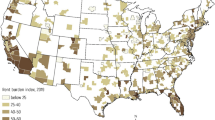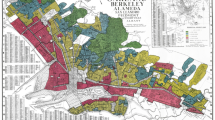Abstract
The nature of housing management has often been contested between two main orientations, business-like (i.e. economic efficiency) and social welfare (i.e. social support), reflecting the dual identity of social housing providers, as both private enterprises and welfare promoters. Research shows that housing management is particularly susceptible to transformations in the broader social housing sector. Considering the last two decades, the demand for social housing has increased across Western Europe, involving different social categories, e.g. low-middle income and, more recently, asylum seekers. On the supply side, housing providers have become keener to involve residents in delivering and managing housing-related services. This paper explores how innovative management strategies are emerging in the context of broader changes in social rented sectors and welfare policies in countries characterised by different typologies of housing systems, Italy and the Netherlands. By means of case studies and semi-structured interviews, this paper scrutinizes specific management approaches, i.e. Integrated Social Management and self-management, in two recent social housing projects in Milan and Amsterdam, which target socially mixed tenants, i.e. status-holders, low-income and young locals. Despite several differences, management approaches in both cases aim to increase tenants’ responsibilisation but with different focus: towards the community, i.e. social integration of vulnerable tenants in the housing project (Dutch case), and towards individual dwellings, i.e. boosting individuals’ self-agency in relation to the maintenance of properties (Italian case). This paper discusses how distinct, and sometimes normative, premises underlying tenants participation in housing management shape specific relationships between residents and housing providers.



Similar content being viewed by others
References
Bolt, G., & van Kempen, R. (2013). Introduction special issue: Mixing neighbourhoods: Success or failure? Cities,35, 391–396.
Bridge, G., Butler, T., & Lees, L. (Eds.). (2012). Mixed communities: Gentrification by stealth?. Bristol: The Policy Press.
Camina, M. M., & Wood, M. J. (2009). Parallel lives: Towards a greater understanding of what mixed communities can offer. Urban Studies,46(2), 459–480.
Costarelli, I., Kleinhans, R., & Mugnano, S. (2019). Reframing social mix in affordable housing initiatives in Italy and in the Netherlands. Closing the gap between discourses and practices? Cities, 90, 131–140.
Czischke, D. (2009). Managing social rental housing in the EU: A comparative study. International Journal of Housing Policy, 9(2), 121–151.
Czischke, D. (2018). Collaborative housing and housing providers: Towards an analytical framework of multi-stakeholder collaboration in housing co-production. International Journal of Housing Policy,18(1), 55–81.
Czischke, D., Gruis, V., & Mullins, D. (2012). Conceptualising social enterprise in housing organisations. Housing Studies,27(4), 418–437.
Czischke, D., & Huisman, C. (2018). Integration through collaborative housing? Dutch starters and refugees forming self-managing communities in Amsterdam. Urban Planning,3(4), 156–165.
Damer, S. (2000). ‘Engineers of the human machine’: The social practice of council housing management in glasgow, 1895–1939. Urban Studies,37(11), 2007–2026.
Dijkhoff, T. (2014). The Dutch social support act in the shadow of the decentralization dream. Journal of Social Welfare and Family Law,36(3), 276–294.
Ferri, G., Pogliani, L., & Rizzica, C. (2019). Towards a collaborative way of living. Innovating social and affordable housing in Italy. In G. van Bortel, V. Gruis, J. Nieuwenhuijzen, & B. Pluijmers (Eds.), Affordable housing governance and finance (pp. 59–86). Oxon: Routledge.
Flint, J. (2003). Housing and Ethopolitics: Constructing identities of active consumption and responsible community. Economy and Society,32(4), 611–629.
Flint, J. (2004). The responsible tenant: Housing governance and the politics of behaviour. Housing Studies,19(6), 893–909.
Flint, J. (2006). Maintaining an arm’s length? Housing, community governance and the management of ‘problematic’ populations. Housing Studies,21(2), 171–186.
Flint, J., & Kearns, A. (2006). Housing, neighbourhood renewal and social capital: The case of registered social landlords in Scotland. European Journal of Housing Policy,6(1), 31–54.
Fontana, C., & Lareno Faccini, J. (2015). Un nuovo strumentoper la casa sociale. Il Sistema Integrato di Fondi Immobiliari tra rimuneratività e socialità [New tool for social housing. The new integrated system of housing funds between remunerativeness and sociality]. Territorio,74, 163–172.
Franklin, B., & Clapham, D. (1997). The social construction of housing management. Housing Studies,12(1), 7–26.
Haworth, A., & Manzi, T. (1999). Managing the ‘underclass’: Interpreting the moral discourse of housing management. Urban Studies,36(1), 153–165.
Hoekstra, J. (2017). Reregulation and residualization in Dutch social housing: A critical evaluation of new policies. Critical Housing Analysis,4(1), 31–39.
Kleinhans, R. (2017). False promises of co-production in neighbourhood regeneration: The case of Dutch community enterprises. Public Management Review, 19(10), 1500–1518.
Manzi, T. (2010). Promoting responsibility, shaping behaviour: Housing management, mixed communities and the construction of citizenship. Housing Studies, 25(1), 5–19.
Mullins, D., Czischke, D., & van Bortel, G. (2012). Exploring the meaning of hybridity and social enterprise in housing organisations. Housing Studies,27(4), 405–417.
Mullins, D., Milligan, V., & Nieboer, N. (2018). Housing state directed hybridity? The relationship between non-profit housing organizations and the state in three national contexts. Housing Studies,33(4), 565–588.
Musterd, S. (2014). Public housing for whom? Experiences in an era of mature neo-liberalism: The Netherlands and Amsterdam. Housing Studies,29(4), 467–484.
Pareja-Eastaway, M., Bontje, M., & d’Ovidio, M. (2011). Attracting young and high-skilled workers: Amsterdam, Milan and Barcelona. In S. Musterd & A. Murie (Eds.), Making competitive cities (pp. 192–211). Oxford: Wiley-Blackwell.
Pestoff, V., & Brandsen, T. (2013). Co-production: The third sector and the delivery of public services. Oxon: Routledge.
Pickvance, C. G. (2001). Four varieties of comparative analysis. Journal of Housing and the Built Environment,16(1), 7–28.
Pittini, A., Koessl, G., Dijol, J., Lakatos, E., & Ghekiere, L. (2017). The state of housing in the EU 2017. Brussels: Housing Europe.
Priemus, H., Dieleman, F., & Clapham, D. (1999). Current developments in social housing management. Netherlands Journal of Housing and the Built Environment,14(3), 211–223.
Przeworksi, A., & Teune, H. (1970). The logic of comparative social inquiry. New York: Wiley.
Savini, F., Boterman, W. R., van Gent, W. P. C., & Majoor, S. (2016). Amsterdam in the 21st century: Geography, housing, spatial development and politics. Cities,52, 103–113.
Scanlon, K., Fernández Arrigoitia, M., & Whitehead, C. M. E. (2015). Social housing in Europe. European Policy Analysis,17, 1–12.
Tersteeg, A. K., & Pinkster, F. M. (2016). ‘Us up here and them down there’: How design, management, and neighborhood facilities shape social distance in a mixed-tenure housing development. Urban Affairs Review,52(5), 751–779.
Uitermark, J. (2003). ‘Social Mixing’ and the management of disadvantaged neighbourhoods: The Dutch policy of urban restructuring revisited. Urban Studies,40(3), 531–549.
Van der Velden, J., Tiggeloven, P., & Wassenberg, F. (2016). De Magic Mix. Een Verkenning van Wooncomplexen Waar Verschillende Doelgroepen Gemengd Wonen [The magic mix. An exploration of residential complexes where different target groups live together]. Den Haag: Platform 31.
Van Gent, W. P. C., Musterd, S., & Ostendorf, W. (2009). Disentangling neighbourhood problems: Area-based interventions in Western European cities. Urban Research and Practice,2(1), 53–67.
Walker, R. (2000). The changing management of social housing: The impact of externalisation and managerialisation. Housing Studies,15(2), 281–299.
Acknowledgements
This paper is the result of the visiting research programme of Igor Costarelli at OTB Department, Faculty of Architecture and the Built Environment, Delft University of Technology (The Netherlands) from February to September 2017, which has been co-funded by the grant Erasmus+ for Traineeship for the academic year 2016/2017. The authors are grateful to two anonymous reviewers who provided constructive comments and suggestions to improve earlier version of this manuscript. Our thanks go also to all professionals and tenants who were willing to be interviewed.
Author information
Authors and Affiliations
Corresponding author
Additional information
Publisher's Note
Springer Nature remains neutral with regard to jurisdictional claims in published maps and institutional affiliations.
Rights and permissions
About this article
Cite this article
Costarelli, I., Kleinhans, R. & Mugnano, S. ‘Thou shalt be a (more) responsible tenant’: exploring innovative management strategies in changing social housing contexts. J Hous and the Built Environ 35, 287–307 (2020). https://doi.org/10.1007/s10901-019-09680-0
Received:
Accepted:
Published:
Issue Date:
DOI: https://doi.org/10.1007/s10901-019-09680-0




